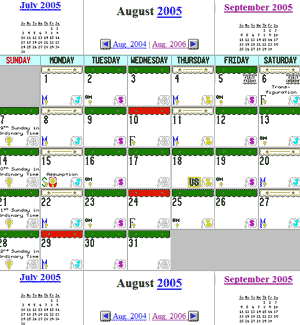Wednesday, August 31, 2005
Saturday, August 27, 2005
HEAVEN: Christians Only?
As promised I will reply to questions that were posted as comments on my previous entry.
"Suppose there are two guys. One's nice old Mr Lim. Mr Lim has been a devout Buddhist all his life. He works as a maths teacher in primary school and loves nurturing young minds. He is a vegetarian, he is a devout husband to his wife and a caring father to his children. He also helps other less fortunate people through charities in his free time.
Now supposed that the other guy is Adolf Hitler. He murdered millions of innocent people and he allowed his army to rape and pillage at will. However, let's say that on his death bed, Hitler suddenly and truly saw the errors in his way and repented for all his sins and embraced God, Jesus Christ, and Christianity with all his heart. And I don't mean some desperate bid for salvation, I mean he REALLY and TRULY believed in Jesus and God.
Now my question is, based on Christianity, who goes to heaven and who to hell when both of them dies here? According to my religious Protestant friend, it's gonna be Hitler. All is forgiven. Disbelievers are condemned to hell, no matter what their other attributes and past actions were.
And I definately cannot see the fairness in this."
Dear Cypher,
Thank you for taking the time to post the comment above. I am Catholic and I will do my best to answer your question from the stance of the Catholic Church.
According to the Dogmatic Constituition on the Church: Lumen Gentium, non-Christians can go to heaven if they fulfill these conditions:
- "[T]hrough no fault of their own do not know the Gospel of Christ or His Church"
- "[S]incerely seek God"
- Doing God's will "as it is known to them through the dictates of conscience"
As for the question whether "Mr. Lim" goes to heaven or hell? I cannot answer that; for who am I to judge one's conscience? I'll leave that up to God. ;) But if "Mr. Lim" does get to heaven, he did so only through the favour and mercy of Our Lord Jesus Christ who is the Way, the Truth and the Life (John 14:6)
God bless.
Friday, August 26, 2005
Thursday, August 25, 2005
World Youth Day 2005 Rubber Wristband
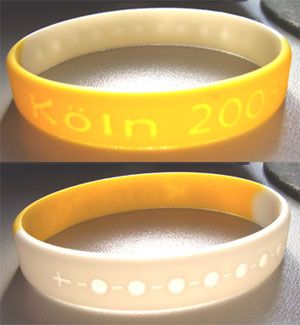
Wednesday, August 24, 2005
24th August: St. Batholomew's Day
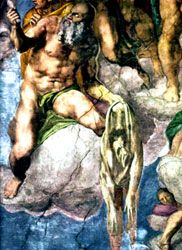
According to scripture, St. Bartholomew was one of the disciples to whom Jesus appeared at the Sea of Tiberias after the resurrection (John 21:2). He also witnessed the ascension (Acts 1:4, 12, 13).
Tradition has it that after the ascension, St. Bartholomew went on a missionary tour to India, where he left behind a copy of the Gospel of Matthew. In works of art he is often represented with a large knife, or, as in Michelangelo's Last Judgment, with his own skin hanging over his arm, tradition holds that in Armenia he was flayed alive and then crucified with his head upside down. This fate has led to him being adopted as the patron saint of tanners.
Source: Wikipedia.com
Monday, August 22, 2005
Year A: Homily for the 21st Sunday in Ordinary Time
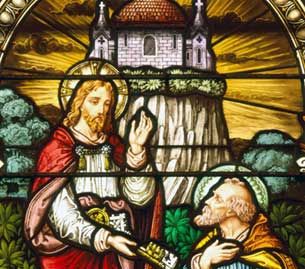 Have you heard of Crab Mentality. It means to pull people down. We don’t like people to be up there—something like misery seeks company. (You know when you’re miserable…you don’t want others to feel good). We like it when people are like us… down here. Today we should be happy because we are to meet one such person: Peter—who is weak like us. It is true that God used him and therefore can use weak individuals like us for his glory but to focus on “Peter being weak like us” is to miss an important fact today.
Have you heard of Crab Mentality. It means to pull people down. We don’t like people to be up there—something like misery seeks company. (You know when you’re miserable…you don’t want others to feel good). We like it when people are like us… down here. Today we should be happy because we are to meet one such person: Peter—who is weak like us. It is true that God used him and therefore can use weak individuals like us for his glory but to focus on “Peter being weak like us” is to miss an important fact today.I want to take a closer look at Peter’s relationship to Jesus and what that means to us as Christians. In the gospel, Peter declared Jesus as Messiah. From here we think in chronological (time) sequence that Peter first declares Christ as Messiah and because Peter is so clever then Christ decides to make Peter be the rock upon which to found the Church. It’s like one after the other. The point I want to make today is that it’s not “first this” and then only “second this”. In fact, I believe that Christ always goes together with Peter. If you want, Peter represents the Church who throughout every age declares Jesus as the Christ. Therefore, one can say that in Peter we have a Petrine ministry whose function is to safeguard the proclamation that Jesus is the Christ. This is why the Pope is called the Servant of the Servants of God. Precisely, his job function is to echo Peter’s answer: You are the Christ. Only then can the office (or the job function) of the Pope make sense. Peter’s ministry and all those who succeed him in the Petrine Ministry are the guarantee of obedience to who Christ is and so to his teachings. That is why that the Church cannot simply do as she likes. If you want; Peter and the Pope are the incarnation of this “obedience”. Let me give an example. During the time of John Paul II, he was asked to change the Church’s teaching on divorce or the indissolubility of marriage. His answer was that the Pope cannot do anything he wants, but he must on the contrary continually rekindle our sense of obedience to the teachings of Christ.
This ministry of the Pope is crucial to the Church’s faithfulness and obedience.
This is where we have trouble and difficulty in believing in this Petrine Ministry because we are disturbed by weakness or perhaps better, we are fascinated by weakness. For example, have you heard of Pope Benedict IX? He was quite scandalous, apparently he became Pope at the age of 11 and not only that for he was 145th, 147th and 150th Pope. Or what about Alexander VI who has always been quoted as one of the most corrupt popes?
The fact is not so much Christ can use weak people but rather that Christ’s power can break through and will always shine through our of human weakness. The Petrine Ministry has existed for 2000 years and what Popes like Benedict IX or Alexander VI had done would have destroyed the Church but they have not. What happened was that those who exercised authority have allowed their humanity to get in the way of their responsibility. Despite that, Christ’s Church has stood. Therefore this speaks more about Christ than about our weaknesses. Therefore, our trust is in Christ’s words: the Church will be built upon Peter and that the power of the underworld can never overcome his Church.
This has implication for us and where I become personal. But it is not an attack of the personal decisions that people have taken. They might have reasons to do so. Yet, I think this where we may make a big mistake. Let me give an example: A misunderstanding with the priest or the parish office staff was very rude and then the person goes to another denomination. I think the person has failed to appreciate Jesus’ promise. I once heard that of this Catholic who proudly proclaimed that she’s now gone to Damansara Utama Methodist Church. The pastor was more happening but most of all they were more accepting. Often people leave the Catholic Church because they have disagreement with Church teachings or with their priests.
Unfortunately this betrays a lack of understanding of the promise of Christ. Put in another way, if there is supposed to be a Church, then the Church of Christ in its fullness cannot be without Peter. The promise of Christ to Peter stands forever, irrespective of whether the Pope is strong or weak. His promise doesn’t become activated when we are weak like the song that is sometime sung: ~You are my strength when I am weak~… No, even if the Pope is strong, Christ would still be his strength.
In conclusion, Christ gave his authority to Peter forever even though every now and then those who exercise this authority let their humanity get in the way of their responsibility. As someone said Christianity is not a collection of truths to be believed or of laws to be obeyed. Rather, Christianity is a person. Christianity is Christ. And therefore the Church must proclaim this person every day in season and out of season and that proclamation is tied to Peter and all his successors who must ensure that the Church does it through her teachings, her celebration and administration. We have something or someone no other religion has… not a celebration of weakness but rather the power of Christ working through human instrumentality.
Feeling Heavy

Sir Brother Sun
Originally uploaded by bookofjohn.
I don't know why my heart feels so heavy for the past week...
Wednesday, August 17, 2005
Testimony of a Prodigal Son
God bless.
---
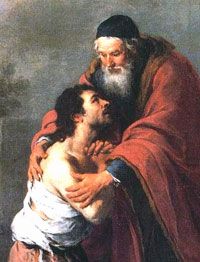 I have a story to tell. But before that, I would like to tell you a little bit about myself. I am a 20 year old guy whose been a somewhat lapse Catholic for most of my life. I didn’t read the Bible and didn’t really pray that often either.
I have a story to tell. But before that, I would like to tell you a little bit about myself. I am a 20 year old guy whose been a somewhat lapse Catholic for most of my life. I didn’t read the Bible and didn’t really pray that often either. In my teenage years, I always regarded religion as something unimportant, not real. I thought of it as a hoax made up by man, giving man a reason to make war and conquer other nations. Basically, I did not have any faith in any religion at all. Call me stupid or ignorant, but that was how I thought when I was in my teens.
Although I did not have faith, I somehow still favoured Catholicism above all other religions. Catholicism gave me a sense of being ‘chosen’.
In later years though, when I started working part-time in a shopping mall, I got to know this girl working there. As time went by, I began to fall in love with her. Before I knew it, I had started a relationship with a non-Catholic girl - a 20 year old Malay girl, to be exact. She was the first love of my life and I was her first too.
We really treasured each other deeply. Life was great when we first fell in love – the happiest yet saddest moments of my life were with her at that time. She was very, very nice to me and I believed that no other person of the opposite sex (apart from her and my mother) would ever treat me so well. I was very much attracted to her beauty and her personality. At the time, all I could think of was her. I did not want to lose her. I did not really mind converting to Islam for her, since I was of the opinion that all religions are man-made anyhow. For your information, Malaysia has a law forbidding Moslems to convert to other religions. Those who marry Moslems are required to convert to Islam.
I was prepared to do anything just to be with her as I was very much in love. The only thing I worried about was my family’s disapproval. I even went so far as to plan to ‘disappear’ from my family after completing my studies just to be with her.
But deep down in my heart, my conscience was pricking me, and I felt like something was not right. I needed a definite answer. I needed to know for certain that God really existed and that religion was not man’s creation. At the time, I was Kuala Lumpur (KL) pursuing my degree, yet continuing my relationship with her long distance.
When I was in KL, I contacted a good friend of mine. He told me about this camp organised by Lifeline College & Young Adults Ministry, and he invited me to sign up. At the time, I was not really interested in the camp but my friend insisted that I should go. So, I went to the camp and it was great. I met many Catholic youths and made friends with them. But my ultimate objective was not so much to make friends as it was to make a decision.
During the camp, there was this part known as the Adoration of the Blessed Sacrament – where Jesus is worshipped in the Eucharist. I was desperate for an answer and I lifted up a sincere prayer, asking God to show me a sign that He was real and if He really wanted me NOT to walk away from Him. I told Him that if I were to leave my girlfriend for Him, would He please bless her for me, PLEASE!!
It was very difficult. I could not bear to leave her and I asked God to give me courage and assurance to leave her for Him. I prayed very hard. From sitting on the floor to kneeling down before Him, I was desperate to know Him and I realized, that I felt really lost. I opened myself up to Him.
From where I was kneeling, I could see out of this tinted glass window to a wall. Everyone else was focusing on the Blessed Sacrament but something else caught my eye. I saw this image on the wall through the tinted window. At first, I could see the image of the Virgin Mary , then it changed to the image of Jesus, then back again to the Virgin Mary. It seemed to alternate between the 2 images.
I thought I was imagining it all, and wondered what was happening to me. I was really bothered by the images I saw. The last image I saw was the face of Jesus Christ carrying a cross with a beautiful crown on his head. At the time , I still did not believe that I saw those images - I thought I had imagined it all.
But my vision was confirmed by one of the speakers, known to have the gift of knowledge. He said, "There is one man in this room who did not have faith in Me , who thinks that I do not love him. Fear not, My child, for I have revealed My image to you tonight. Come with Me because I am your Father". When I heard that, I burst into tears. I was so touched, and I felt like a fool for doubting Him.
Finally, after so long, I came to my senses. I felt good. God really came when I sincerely sought Him. I finally understood that He was there all along. He is REAL. He is the Living God, and He is my king. I mean, how wonderful to know that a king would die for all of us at the cross, for all our selfish mistakes that our Father would not want us to repeat. How wonderful it is that a king would sacrifice Himself just for us. I mean, He could have left us in our sin, to spent eternity in hell. But because He loves His people so much, He willingly died for us on the cross to atone for our sins and save us.
And this is how I repay Him? By leaving Him for a girl? NEVER! I finally realised that I must not be selfish. He died on the cross and this is not how I am going to repay Him, not by leaving Him. People are trying to spread the Good News of the Lord and what am I doing, trying to kill the religion? What would happen if everyone were to be as selfish as me? Would there be no Catholics in the world anymore? Would God have then sent His only Son FOR NOTHING?
So…I decided to leave her. And I really did it the next day. I told her that I couldn’t be with her because I couldn’t afford to lose my religion. She understood and didn’t try to change my mind. But we were both sad...those times and memories we shared!
Yet, I did not regret what I did then. And now? It’s been four months already...I am still going strong with my life , trying my best to be a good Catholic. I believe that no matter what happens, the Lord is still with me. I’m trying to seek Him in everything. I believe that if I seek Him sincerely , He will always come to me.
Silver Lining
Praise the LORD.
Praise God in his sanctuary;
praise him in his mighty heavens.
Praise him for his acts of power;
praise him for his surpassing greatness.
Praise him with the sounding of the trumpet,
praise him with the harp and lyre,
praise him with tambourine and dancing,
praise him with the strings and flute,
praise him with the clash of cymbals,
praise him with resounding cymbals.
Let everything that has breath praise the LORD.
Praise the LORD.
Sunday, August 14, 2005
Solemnity of the Assumption
On November 1, 1950, Pius XII defined the dogma of the Assumption. Thus he solemnly proclaimed that the belief whereby the Blessed Virgin Mary, at the close of her earthly life, was taken up, body and soul, into the glory of heaven, definitively forms part of the deposit of faith, received from the Apostles. To avoid all that is uncertain the Pope did not state either the manner or the circumstances of time and place in which the Assumption took place — only the fact of the Assumption of Mary, body and soul, into the glory of heaven, is the matter of the definition.
The Assumption
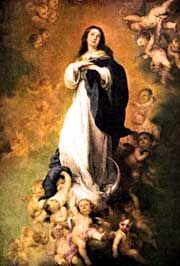
The Assumption is the oldest feast day of Our Lady, but we don't know how it first came to be celebrated.
Its origin is lost in those days when Jerusalem was restored as a sacred city, at the time of the Roman Emperor Constantine (c. 285-337). By then it had been a pagan city for two centuries, ever since Emperor Hadrian (76-138) had leveled it around the year 135 and rebuilt it as Aelia Capitolina in honor of Jupiter.
For 200 years, every memory of Jesus was obliterated from the city, and the sites made holy by His life, death and Resurrection became pagan temples.
After the building of the Church of the Holy Sepulchre in 336, the sacred sites began to be restored and memories of the life of Our Lord began to be celebrated by the people of Jerusalem. One of the memories about his mother centered around the "Tomb of Mary," close to Mount Zion, where the early Christian community had lived.
On the hill itself was the "Place of Dormition," the spot of Mary's "falling asleep," where she had died. The "Tomb of Mary" was where she was buried.
At this time, the "Memory of Mary" was being celebrated. Later it was to become our feast of the Assumption.
For a time, the "Memory of Mary" was marked only in Palestine, but then it was extended by the emperor to all the churches of the East. In the seventh century, it began to be celebrated in Rome under the title of the "Falling Asleep" ("Dormitio") of the Mother of God.
Soon the name was changed to the "Assumption of Mary," since there was more to the feast than her dying. It also proclaimed that she had been taken up, body and soul, into heaven.
That belief was ancient, dating back to the apostles themselves. What was clear from the beginning was that there were no relics of Mary to be venerated, and that an empty tomb stood on the edge of Jerusalem near the site of her death. That location also soon became a place of pilgrimage. (Today, the Benedictine Abbey of the Dormition of Mary stands on the spot.)
At the Council of Chalcedon in 451, when bishops from throughout the Mediterranean world gathered in Constantinople, Emperor Marcian asked the Patriarch of Jerusalem to bring the relics of Mary to Constantinople to be enshrined in the capitol. The patriarch explained to the emperor that there were no relics of Mary in Jerusalem, that "Mary had died in the presence of the apostles; but her tomb, when opened later . . . was found empty and so the apostles concluded that the body was taken up into heaven."
In the eighth century, St. John Damascene was known for giving sermons at the holy places in Jerusalem. At the Tomb of Mary, he expressed the belief of the Church on the meaning of the feast: "Although the body was duly buried, it did not remain in the state of death, neither was it dissolved by decay. . . . You were transferred to your heavenly home, O Lady, Queen and Mother of God in truth."
All the feast days of Mary mark the great mysteries of her life and her part in the work of redemption. The central mystery of her life and person is her divine motherhood, celebrated both at Christmas and a week later (Jan. 1) on the feast of the Solemnity of Mary, Mother of God. The Immaculate Conception (Dec. 8) marks the preparation for that motherhood, so that she had the fullness of grace from the first moment of her existence, completely untouched by sin. Her whole being throbbed with divine life from the very beginning, readying her for the exalted role of mother of the Savior.
The Assumption completes God's work in her since it was not fitting that the flesh that had given life to God himself should ever undergo corruption. The Assumption is God's crowning of His work as Mary ends her earthly life and enters eternity. The feast turns our eyes in that direction, where we will follow when our earthly life is over.
The feast days of the Church are not just the commemoration of historical events; they do not look only to the past. They look to the present and to the future and give us an insight into our own relationship with God. The Assumption looks to eternity and gives us hope that we, too, will follow Our Lady when our life is ended.
In 1950, in the Apostolic Constitution Munificentissimus Deus, Pope Pius XII proclaimed the Assumption of Mary a dogma of the Catholic Church in these words: "The Immaculate Mother of God, the ever-virgin Mary, having completed the course of her earthly life, was assumed body and soul into heaven."
With that, an ancient belief became Catholic doctrine and the Assumption was declared a truth revealed by God.
Fr. Clifford Stevens in Catholic Heritage
Friday, August 12, 2005
Thanksgiving
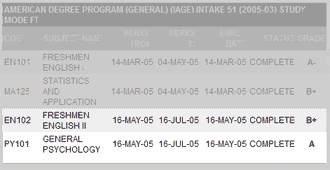
Thursday, August 11, 2005
Absolute Truth VS. Philosophical Relativism
"We can't judge which religion is superior than the others. None of us can judge that."
The fact is there IS absolute truth (i.e. truth that can be applied to anyone regardless whether they believe in it) and a very good analogy of it is:
Gravity
The pull of gravity affects EVERYONE regardless of their belief in its existence.
Christianity subscribes to the idea of absolute truth; as Christians believe that Jesus is our only hope for our salvation for "[s]alvation is found in no one else, for there is no other name under heaven given to men by which we must be saved." (Acts 4:12) and this applies to everyone not only Christians.
To some St. Peter (the one quoted saying Acts 4:12) might sound like a bigot and their immediate response might be:
"Hey, there is no such truth that can be applied to everyone regardless of what they believe in it! (i.e. there is no such thing as absolute truth)"
Sunday, August 07, 2005
Part 2: Do all religions lead to God?
 Thank you people for your honest comments in my previous post! And the conclusion is: almost 66% of the voters are DO NOT agree that all religions lead to God, whereas almost 28% agree that all religions lead to God.
Thank you people for your honest comments in my previous post! And the conclusion is: almost 66% of the voters are DO NOT agree that all religions lead to God, whereas almost 28% agree that all religions lead to God.Now, the reason for my provocative post was to know whether most people subscribe to the idea of relgious relativism..
which is the belief that ALL religions are simply different pathways to the SAME ultimate reality.
Anyway as the result suggests, most people (at least the ones visiting this blog) do not subscribe to religious relativism. (thank God!) Seriously, to believe all religions lead to God is a nonsensical stance simply because different religions have different concepts of God. For example in Hinduism God is the universe (pantheism) whereas in Christianity we have the concept of a personal God (the Trinity; the Father, the Son and the Holy Spirit) who knows us by name and loves us. Besides that, the concept of salvation between religions is drastically different. Correct me if I am wrong, in Islam; salvation is to enter into a Paradise of sensual pleasures whereas for in Christianity; salvation is to have conscious personal fellowship with God for all eternity. Oh and by the way, pure Buddhism is atheistic.
So tell me how can one reconcile the idea of religious relativism when the differences are so significant?
Wednesday, August 03, 2005
Survey: Do all religions lead to God?
If you would like to comment regarding this topic, please do so in the comment section (the link can be found at the top right hand corner of this entry) :)

